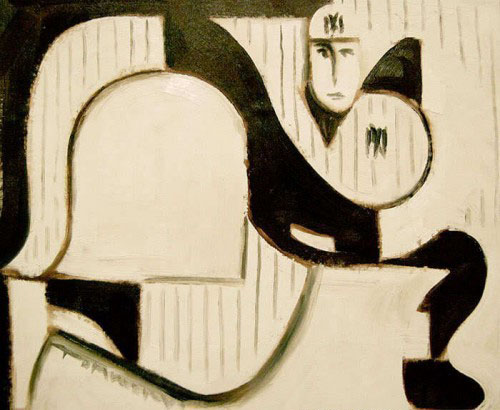My ‘America’s Game’ as an Audio Opera
by Richard Kostelanetz (July 2017)

The Awl, by Tommervik
Some years ago I composed a 60-minute audiotape of and about the sound of baseball as indigenous to the Americas. As it included passages in both Spanish and French-Canadian, I thought that my electro-acoustic composition, to recall a 20th-Century epithet, represented all of North America.
It has two sections, each 30 minutes long, each opening with sounds typical of the beginning of a game and closing with the ending sounds. Within each section were sounds unique to baseball, such as balls hitting bats or gloves, crowds gossiping and cheering as they do only at baseball games, players urging each other with imprecations likewise unique to Americas’ game, all while suggesting narrative that, though primarily acoustic, they reflect people moving and clearly speaking (their movements and words clearly audible), without suggesting any particular images.
Sometime later, I realized that I’d composed a sort of opera, indeed perhaps a uniquely American two-act opera, that would exist only on audiotape and thus take its place among operas produced initially for radio, mostly in Europe, as far back as the 1920s. Shorter than staged operas, these should not be confused with the more familiar theatrical operas, even when the latter are broadcast and rebroadcast on radio. Indeed, some audio operas were less than fifteen minutes in length. I recall that prior to composing Americas’ Game, I was listening to operas, particularly George Gershwin’s Porgy and Bess, initially because I wanted the pace of his aria “Summertime,” as baseball is a warm-weather game.
The latest Wikipedia webpage identifies the first radio opera as probably The Red Pen (1925) that the BBC commissioned from Geoffrey Toye to a libretto by A. P. Herbert.
“The 1930s proved to be the high-point of radio opera, with at least twelve productions composed by German, American, Czech, Swiss, and French composers.”
Among those produced in America were Charles Wakefield Cadman’s The Willow Tree (NBC Radio, 1932), Vittorio Giannini’s Flora and Beauty and the Beast (CBS Radio, 1937 & 1938), Gian Carlo Menotti’s The Old Maid and the Thief (CBS, 1939), and Randall Thompson’s Solomon and Balkis (CBS, 1941). I’ve not heard any of them, though now I wish they were more available. Nor have I ever heard Amy Kohn’s 1, Plum Square, which WNYC broadcast in 2005.
From knowledge of most of these composers’ other works, may I suspect that these radio operas were closer to “soap operas,” say, in their narrative specificity and to Broadway musicals with songs, rather than to Audio art? From that distinction alone, may I claim that my Americas’ Game might be the Great American Audio Opera that has, to my knowledge, no competitors?
Click here to listen. A new tab displays.
To comment on this article, please click here.
___________________________________________

Richard Kostelanetz recently completed a book of previously uncollected critiques, Deeper, Further, and Beyond. Individual entries on his work in several fields appear in various editions of Readers Guide to Twentieth-Century Writers, Merriam-Webster Encyclopedia of Literature, Contemporary Poets, Contemporary Novelists, Postmodern Fiction, Webster’s Dictionary of American Writers, The HarperCollins Reader’s Encyclopedia of American Literature, Baker’s Biographical Dictionary of Musicians, Directory of American Scholars, Who’s Who in America, Who’s Who in the World, Who’s Who in American Art, NNDB.com, Wikipedia.com, and Britannica.com, among other distinguished directories. Otherwise, he survives in New York, where he was born, unemployed and thus overworked.
To help New English Review continue to publish thought-provoking articles, please click here.
If you enjoyed this article and want to read more by Richard Kostelanetz, please click here.